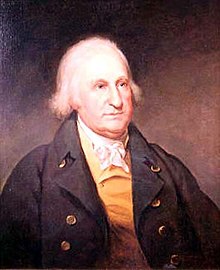John Eager Howard
| John Eager Howard | |
|---|---|

John Eager Howard by Charles Willson Peale, 1823
|
|
|
United States Senator from Maryland |
|
|
In office November 21, 1796 – March 3, 1803 |
|
| Preceded by | Richard Potts |
| Succeeded by | Samuel Smith |
| 5th Governor of Maryland | |
|
In office November 24, 1788 – November 14, 1791 |
|
| Preceded by | William Smallwood |
| Succeeded by | George Plater |
| Member of the Maryland Senate | |
|
In office 1791–1795 |
|
| Personal details | |
| Born | June 4, 1752 Baltimore County, Maryland |
| Died | October 12, 1827 (aged 75) 'Belvidere', Baltimore County, Maryland |
| Resting place | Old Saint Paul's Cemetery, Baltimore, Maryland |
| Political party | Federalist |
| Spouse(s) | Peggy Chew |
| Children | John Eager Howard, Jr., George Howard, Benjamin Chew Howard, Dr. William Howard, Juliana Howard McHenry, James Howard, Sophia Howard Read, Charles Howard |
| Residence | 'Belvidere', Baltimore County, Maryland |
| Profession | Politician |
| Religion | Anglican, Episcopalian |
John Eager Howard (June 4, 1752 – October 12, 1827) was an American soldier and politician from Maryland. He was elected as governor of the state in 1788, and served three one-year terms. He also was elected to the Continental Congress, the Congress of the United States and the U.S. Senate. In the 1816 presidential election, Howard received 22 electoral votes for vice president on the Federalist Party ticket with Rufus King. The ticket lost in a landslide.
Howard County, Maryland, is named for him, along with Eager Street and Howard Street in Baltimore.
He was the son of Cornelius Howard and Ruth (Eager) Howard, of the Maryland planter elite and was born at their plantation "The Forest." Howard grew up in an Anglican slaveholding family. Anglicanism was the established church of the Chesapeake Bay colonies.
Howard joined the Baltimore lodge of Freemasonry and eventually became a Brother.
Commissioned a captain at the beginning of the American Revolutionary War, Howard rose in 1777 to the rank of colonel in the Continental Army, fighting in the Battle of White Plains and in the Battle of Monmouth. He was awarded a silver medal by Congress for his leadership at the 1781 Battle of Cowpens, during which he commanded the 2nd Maryland Regiment, Continental Army. In September 1781, he was wounded in a bayonet charge at the Battle of Eutaw Springs.Nathanael Greene wrote that Howard was "as good an officer as the world affords. He has great ability and the best disposition to promote the service....He deserves a statue of gold."
...
Wikipedia
